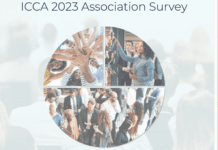
There has been a proliferation of fraudulent and predatory conferences, often poor-quality conferences parading as the real thing.
Predatory conferences present “an industrial-scale challenge” to bonafide associations and the quality education they provide, said Senthil Gopinath, CEO, International Congress and Convention Association (ICCA).
These predatory conferences often have a veneer of respectability, including fake testimonials from respected professors who do not realize their names and photos are being falsely used. Of major concern to meeting planners is that their names mimic those of legitimate conferences, potentially siphoning off attendees.
“Predatory conferences are a growing area of concern in academia,” said Julie N. Hornick, Instructional Services Librarian at Florida Southern College, who researched the subject with associates Steven Wade and Marina Morgan. “Travel budgets are limited and a presenter who goes to a predatory conference may not (be able to) go to a legitimate conference.”
There is no easy answer. Fake conferences that collect fees but do not take place can be prosecuted, said Gopinath. On the other hand, poor-quality conferences operate in a “gray area” that may be unethical but not clearly illegal.
ICCA suggests that event planners be on the looking for the following telltale warning signs:
- No contact address of the organizer is provided
- No venue is known
- Abstracts are approved within 72 hours
- Presenters pay a higher registration fee than non-presenting delegates
- Many different topics are discussed at a single meeting
- There are many conferences by the same organizer in the same city on the same dates
- The same website layout and images are used to market multiple events.
ICCA maintains a list of predatory meetings and questionable conference organizers for its members and denies these organizers access to their database. It also asks that its members bring questionable conferences to its attention.
Dana Roth, special projects librarian at Caltech, maintains an open-access database of predatory journals and questionable conferences and other useful information on the topic. “Entries are the result both of people contacting me with complaints, and from information published in various sources,” he said.
The growth of questionable conferences means that planners of newer conferences may have more work to do in terms of establishing their legitimacy, said Hornick. Transparency is key, including information about the organizing committee, a clearly stated and rigorous peer review process, sponsorship by well-known companies and organizations related to the topic, and no obvious conflicts of interest.
You Might Also Be Interested In
Negotiated Rates Not Always a Deal










